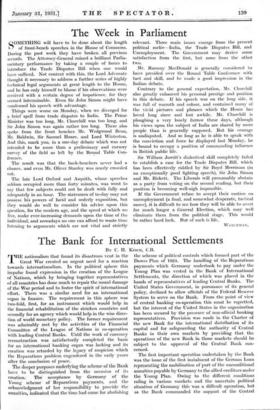The Week in Parliament
SOMETHING will have to be done about the length of front-bench speeches in the House of Commons. During the past week they have broken all previous records. The Attorney-General ruined a brilliant Parlia- mentary performance by taking a couple of hours to introduce the Trade Disputes Bill when one would have sufficed. Not content with this, the Lord Advocate thought it necessary to address a further series of highly technical legal arguments at great length to the House, and he has only himself to blame if his observations were received with a certain degree of impatience, for they seemed interminable. Even Sir John Simon might have condensed his speech with advantage.
Things were worse on Monday, when we diverged for a brief spell from trade disputes to India. The Prime Minister was too long, Mr. Churchill was too long, and Sir John Simon was again rather too long. There also spoke from the front benches Mr. Wedgwood Benn, Mr. Baldwin, Sir Samuel Hoare, and Lord Winterton. And this, mark you, in a one-day debate which was not intended to be more than a preliminary and cursory survey of the field as left by the Round Table Con- ference.
The result was that the back-benchers never had a chance, and even Mr. Oliver Stanley was nearly crowded out.
The late Lord Oxford and Asquith, whose speeches seldom occupied more than forty minutes, was wont to say that few subjects could not be dealt with fully and adequately in an hour. The statesmen of to-day may not possess his powers of lucid and orderly exposition, but they would do well to consider his advice , upon this question, for the modern age, and the speed at which we live, make ever-increasing demands upon the time of the individual, and nowadays no one can afford to waste time listening to arguments which are not vital and strictly relevant. Three main issues emerge from the present political melee—India, the Trade Disputes Bill, and Unemployment. The Government may derive some satisfaction from the first, but none from the other two.
Mr. Ramsay MacDonald is generally considered to have presided over the Round Table Conference with tact and skill, and he made a good impression in the Indian debate.
Contrary to the general expectation, Mr. Churchill also greatly enhanced his personal prestige and position in this debate. If his speech was on the long side, it was full of warmth and colour, and 'contained many of the vivid pictures and phrases which the House has loved long since and lost awhile. Mr. Churchill is ploughing a very lonely furrow these days, although his views upon the subject of India are shared by more people than is generally supposed. But his courage is undisputed. And so long as he is able to speak with the conviction and force he displayed last Monday, he is bound to occupy a position of commanding influence in British public life.
Sir William Jowitt's dialectical skill completely failed to establish a case for the Trade Disputes Bill, which has been effectively riddled by Sir Boyd Merriman (in an exceptionally good fighting speech), Sir John Simon and Mr. Birkett. The Liberals will presumably abstain as a party from voting on the second reading, but their position is becoming well-nigh impossible.
If the Government refuse to accept their motion on unemployment (a final, and somewhat desperate, tactical move), it is difficult to see how they will be able to avert for much longer a General Election, which may well eliminate them from the political stage. This would be rather hard luck. But of such is life.
WATCHMAN.






































 Previous page
Previous page